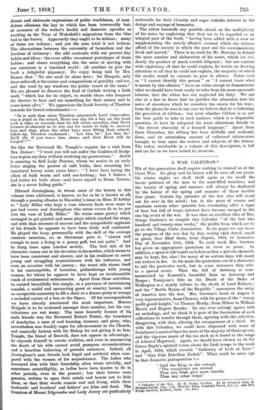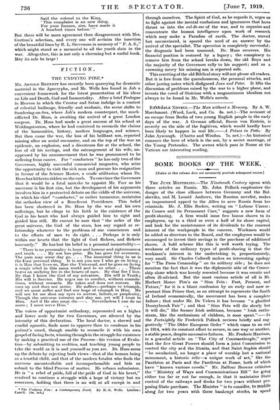A WAR CALENDAR.•
WE of this generation shall require nothing to remind us of the Great War. Its glory and its horror will lie over all our years. On winter nights we shall thrill again as we recall the heroic patience of the men in the mud-filled trenches; and the beauty of spring and summer will always be shadowed by the horror of the spring and summer of those terrible four years. Certain big episodes of the war also will stand out for ever in the mind ; but in the press of events and emotions certain other episodes less resounding after a lapse of time but full of tragic interest have become merged in the one big event of the war. It was thus an excellent idea of Mrs. Sturge Gretton's to compile this Calendar "of the last two hundred and twenty-nine weeks," the profits from which are to go to the Village Clubs Association. In its pages we can trace the progress of the war day by day, noting each detail, small or great, that filled them, from August, 1914, to Armistice Day of November 11th, 1918. To each week Mrs. Gretton has given an appropriate quotation in verse or prose. In addition, a space is left beside each date so that a private chronicle may be kept, for, alas I for many of us certain days will stand out written in fire. In the main the quotations arc of a character to suit the particular week, but in some instances they refer to a special event. Thus the fall of Antwerp is com- memorated by Rossetti's beautiful lines on Antwerp and Bruges ; Tennyson's Ode on the Death of the Duke of Wellington is a stately tribute to the death of Lord Roberts ; and the " Battle Hymn of the Republic " announces the entry of America into the war. Mrs. Gretton's band of singers is very representative, from Chaucer, with his praise of the " verray parfit $entil knight," to Thomas Hardy; from Milton to William Morris and Rupert Brooke. No one ever entirely agrees with an anthology, and we think it is part of the fascination of such collections to wander through them, agreeing with this selection, disagreeing with that, altering the arrangement of a think So with this Calendar, we could have dispensed with some of Swinbunne's musical lines for more of the majesty of Shakespeare, and the vigorous music of the sea such as is found in the songs of Admiral Hopwood. Again, we should have chosen to fit Sir Conan Doyle's spirited verses about the Irish troops to the week in April, 19.16, which records " Gallantry of Irish at Loos " and " Sinn Fein Rebellion Ended." What could be more apt to that dramatic juxtaposition 1—
"Said the King to the colonel, The complaints are eternal That you Irish give more trouble Than any other corps.'
• Calendar of the War. By M. Stuns Gretton. To be obtained from Sc. Itolland.Martio, Esq., C.B., Martin's Bank, Lombard &rook E.C. 3; and Mrs. Sturge Gretton, Burford, Oxon. Oa net.]
Said the colonel to the King, ' This complaint is no new thing, For your foemen, sire, have made it A hundred times before.' "
But there will be more agreement than disagreement with Mrs. Gretton's selection, and every one will acclaim the insertion of the beautiful lines by R. L. Stevenson in memory of " F. A. S.," which might stand as a memorial to all the youth slain in the war. Altogether, this is not only a charming but a useful book. May its sale be large !



































 Previous page
Previous page